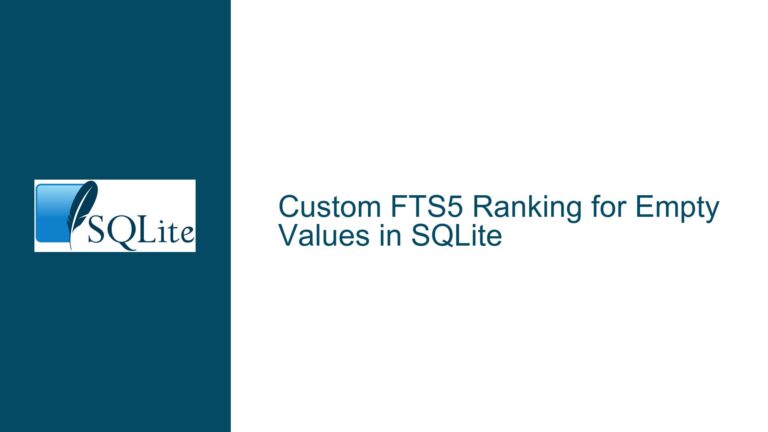SQLite Schema Ambiguity with Identically Named Tables
SQLite Schema Ambiguity in Table Information Retrieval
When working with SQLite, it is not uncommon to encounter scenarios where tables with the same name exist in different schemas. This can lead to confusion when attempting to retrieve metadata about these tables using built-in pragmas or virtual table mechanisms. Specifically, the behavior of pragma_table_info and its interaction with schemas can be unintuitive, especially when the table name is not fully qualified with its schema. This issue arises because SQLite’s schema search order and the way pragmas handle schema specifications are not always straightforward.
For example, consider a scenario where a table named t exists in both the main and temp schemas. When querying pragma_table_info("t"), the results might not align with expectations if the schema is not explicitly specified. This behavior is rooted in SQLite’s schema search order, which prioritizes the temp schema over the main schema. Additionally, the virtual table implementation of pragma_table_info introduces hidden parameters (arg and schema) that are not immediately obvious, further complicating the issue.
This post will delve into the nuances of SQLite’s schema handling, the role of pragmas in retrieving table metadata, and how to avoid common pitfalls when working with identically named tables across different schemas.
Misunderstanding Schema Search Order and Pragma Behavior
The core of the issue lies in how SQLite resolves table names across schemas and how pragmas interpret schema specifications. SQLite maintains multiple schemas, including main, temp, and any attached databases. When a table name is referenced without an explicit schema, SQLite follows a predefined search order to resolve the table. By default, the temp schema is searched first, followed by the main schema, and then any attached schemas in the order they were attached.
This search order becomes problematic when tables with the same name exist in multiple schemas. For instance, if a table t exists in both the temp and main schemas, a query like pragma_table_info("t") will return metadata for the temp.t table, not the main.t table. This is because the temp schema is searched first, and the table name is resolved to the first match found.
Furthermore, the virtual table implementation of pragma_table_info introduces additional complexity. The pragma_table_info virtual table has two hidden columns: arg and schema. These columns allow you to specify the table name and schema as part of the query, but their usage is not immediately obvious. For example, the query select * from pragma_table_info where arg='t' and schema='main'; explicitly retrieves metadata for the main.t table. However, if the schema is not specified, the virtual table defaults to the schema search order, leading to potential ambiguity.
Another layer of confusion arises from the syntax used to specify schemas in pragmas. The statement pragma main.table_info("t"); explicitly targets the main.t table, but the equivalent virtual table query requires careful handling of the arg and schema parameters. This discrepancy can lead to misunderstandings, especially for users who are not familiar with the internal workings of SQLite’s pragma system.
Resolving Schema Ambiguity with Explicit Schema Specification and Virtual Table Parameters
To avoid ambiguity when working with identically named tables across different schemas, it is essential to explicitly specify the schema in all queries. This can be achieved using both traditional pragma syntax and virtual table queries. Below are detailed steps and solutions to address this issue:
Explicit Schema Specification in Pragma Statements
When using pragma statements, always qualify the table name with its schema. For example, instead of writing pragma table_info("t");, use pragma main.table_info("t"); to explicitly target the main.t table. This ensures that the correct table is referenced, regardless of the schema search order.
Similarly, when working with the temp schema, use pragma temp.table_info("t"); to retrieve metadata for the temp.t table. This approach eliminates any ambiguity and ensures consistent results.
Leveraging Virtual Table Parameters for Schema-Specific Queries
The pragma_table_info virtual table provides hidden parameters (arg and schema) that allow for precise control over which table and schema are queried. To retrieve metadata for a specific table in a specific schema, use a query like select * from pragma_table_info where arg='t' and schema='main';. This query explicitly targets the main.t table, bypassing the schema search order.
If you need to retrieve metadata for a table in the temp schema, modify the query to select * from pragma_table_info where arg='t' and schema='temp';. This approach ensures that the correct table is queried, even if a table with the same name exists in another schema.
Understanding the Schema Search Order
To avoid unexpected results, it is crucial to understand SQLite’s schema search order. By default, SQLite searches the temp schema first, followed by the main schema, and then any attached schemas. This order can lead to ambiguity when tables with the same name exist in multiple schemas.
To mitigate this, always qualify table names with their schema when creating or querying tables. For example, instead of creating a table with create table t as select 1 a;, use create table main.t as select 1 a; to explicitly specify the schema. This practice ensures that the table is created in the intended schema and avoids potential conflicts.
Best Practices for Schema Management
To maintain clarity and avoid ambiguity, adopt the following best practices when working with multiple schemas in SQLite:
Always Qualify Table Names with Schemas: Whether creating, querying, or retrieving metadata for tables, always specify the schema. This practice eliminates ambiguity and ensures consistent results.
Use Explicit Schema Specification in Pragma Statements: When using pragmas like
table_info, always qualify the table name with its schema. This ensures that the correct table is referenced, regardless of the schema search order.Leverage Virtual Table Parameters for Precision: When using the
pragma_table_infovirtual table, utilize theargandschemaparameters to explicitly specify the table and schema being queried. This approach provides precise control over the query and avoids ambiguity.Document Schema-Specific Queries: When writing queries that involve multiple schemas, document the schema specifications clearly. This practice helps maintain clarity and ensures that other developers understand the intended behavior.
Test Queries Across Schemas: When working with identically named tables across different schemas, test your queries thoroughly to ensure that they behave as expected. This step is especially important when using pragmas or virtual tables to retrieve metadata.
By following these best practices, you can avoid the pitfalls associated with schema ambiguity and ensure that your SQLite queries and schema designs are robust and maintainable.
Example Scenarios and Solutions
To illustrate the concepts discussed above, consider the following example scenarios and their corresponding solutions:
Scenario 1: Retrieving Metadata for a Table in the main Schema
Suppose you have a table t in the main schema and want to retrieve its metadata. Instead of using pragma table_info("t");, which might return metadata for a table in the temp schema, use pragma main.table_info("t");. This ensures that the metadata for the main.t table is retrieved.
Alternatively, you can use the virtual table query select * from pragma_table_info where arg='t' and schema='main'; to achieve the same result.
Scenario 2: Retrieving Metadata for a Table in the temp Schema
If you have a table t in the temp schema and want to retrieve its metadata, use pragma temp.table_info("t"); to explicitly target the temp.t table. This approach avoids ambiguity and ensures that the correct metadata is retrieved.
Alternatively, use the virtual table query select * from pragma_table_info where arg='t' and schema='temp'; to achieve the same result.
Scenario 3: Creating Tables with Explicit Schema Specifications
When creating tables, always specify the schema to avoid ambiguity. For example, instead of create table t as select 1 a;, use create table main.t as select 1 a; to explicitly create the table in the main schema. This practice ensures that the table is created in the intended schema and avoids potential conflicts.
Conclusion
Working with identically named tables across different schemas in SQLite can be challenging, especially when retrieving metadata using pragmas or virtual tables. By understanding SQLite’s schema search order, leveraging explicit schema specifications, and utilizing the hidden parameters of the pragma_table_info virtual table, you can avoid ambiguity and ensure consistent results. Adopting best practices for schema management and thoroughly testing your queries will further enhance the robustness and maintainability of your SQLite databases.






